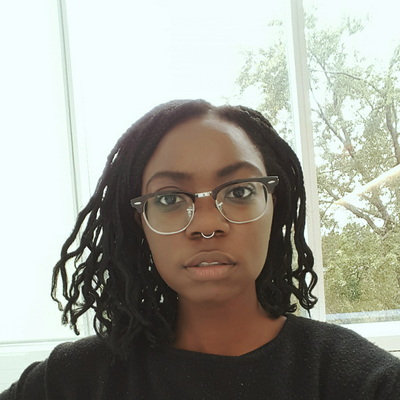CHIMWEMWE UNDI
The Rusty Toque | Issue 11 | Poetry | November 30, 2016
A HISTORY OF HOUSES BUILT OUT OF SPITEnone of us know Amy personally, but she’s here & she’s singing / rising above our sodden heads bowed in something like prayer / maybe // most of us are trying to move enough to pretend she doesn’t remind us of our mothers & Sunday morning spring cleans / the sharp bleached smell of it, the shrill peak of their voices demanding something far less beautiful // we’re trying not / to think of mothers who mostly whisper now // or girls who looked away & uninvited us from sleepovers // even though they were smiling the whole time, or the last time that we were here / how it felt the same when we got home after // it as in everything // the same as in worse / you gotta move sometimes / when you’re stuck in the middle of it, that’s the philosophy we’re buying into here / using drink tickets we bought at the dollar store & / tucked into bras & ace bandages & sagging back pockets // you gotta move // your body a last resort /occupying unceded space // the only thing that’s ever belonged to you & half the girls here have called that into question // girls only because that’s how you get in here / in here just because of the girls / because here is nowhere & here lives the only god that thinks our wetness akin to holy water / that answers / to the tense-bodied hallelujahs escaping mouths we thought / had forgotten how to form them // us broken daughters & all our pieces jangling // all strobe light, sweat & saxophone // when Amy died / we danced off the sorrow we knew / our mothers would shed / split their self-satisfied smugness // between us like a quarter // we tucked a backbeat under / a promise of an always love / used those tickets to buy into that sacred oath in mezzo-soprano //& we moved to it right into it // cause that’s what the fuck you do // our love been a losing game, Amy // we know the power of no / no // no // even when it was the wrong thing / & we know we belong here / maybe not everywhere / but that’s what nowhere is for / & here we are / in the middle of it // besides / it’s different for us / us as in everyone //different as in the same.
KINDLINGblack boy breaks,
beats bullet to its destination. the boundless trauma of nothingness bears down, eventually. the buckled knees. blood and piss on statehouse steps. lieutenant cannot name a cause for demon victory (though whiteness has no alibi) is unused to reading suicide notes from picket signs. the black body is imagined invincible, then tested. the desire to die is our caving to popular demand. the reasons: our hard ebony, our impenetrable, our good bodies for shadows, for plantations, for white girls who giggle-whisper our animal prowess, for specialized porn search terms and basketball teams. our negro magic, our noble savagery, our fevered jungles, our avuncular tomfoolery, we aunt jemimas and uncle toms. we entertainment and twitter feed. we are not human enough to be haunted, our fear is proved reasonable, our invasive thoughts are echoed by real voices, by comment sections, by invading bodies, by law.
the best of us are the black friend, we take our lumps and perm our hair, we laugh off the joke and back up your white goodness. tell the funny story about the protest, tell your grandma it was a different time. we translate ourselves with borrowed tongues and are called articulate for it. (the rest of us are dead.) how do you resist the temptation to throw yourself onto the unholy pyre, when the flame seems inevitable, when you are breathless in a burning house, when you trace a finger up your branchless family tree and find a legacy of kindling, how do you not make flint from your learned hardness after all, we are hard, easy to burn, good to start a fire. |
CHIMWEMWE UNDI is a poet and spoken word artist currently based in Toronto. She has performed at the Canadian Festival of Spoken Word and the Edinburgh International Book Festival, and her work has been shortlisted for the 2016 Brunel University African Poetry Book Prize. Her debut chapbook, The Habitual Be, is forthcoming from University of Nebraska Press.


